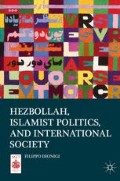Abstract
The previous case has highlighted one instance of the dynamics of Hezbollah’s interaction with International Humanitarian Law (IHL) this chapter analyzes Hezbollah’s approach to the legislative process in relation to human rights laws. As it was previously mentioned, in 1992, Hezbollah decided to take part in parliamentary politics in Lebanon after a lengthy discussion within its ranks regarding this decision and its effects on its political identity. For this reason, it was necessary to rethink how an Islamist movement could have dealt with norms and institutions not based on Islamic principles but rather inspired by liberal norms such as the sovereignty of a parliament elected by the Lebanese people. Even more problematic was the fact that the parliament could approve laws that may not have been Islamic in their inspiration and sometimes may even be in open conflict with Islamic principles.
Access this chapter
Tax calculation will be finalised at checkout
Purchases are for personal use only
Preview
Unable to display preview. Download preview PDF.
Notes
The most informative accounts on the internal Hezbollah debate on participation in Lebanese politics can be found in Judith P. Harik, Hezbollah: the changing face of terrorism (London; New York: I.B. Tauris, 2004), pp. 47–62;
Amal Saad-Ghorayeb, Hizbu’llah: politics and religion, Critical studies on Islam (London; Sterling, VA: Pluto Press, 2002), pp. 47–58. Magnus Ranstorp, “The strategy and tactics of Hizballah’s current ‘Lebanonization’ process,” Mediterranean Politics 3, no. 1 (1998).
Ahmad Nizar Hamzeh, In the path of Hizbullah, 1st ed., Modern intellectual and political history of the Middle East (Syracuse, NY: Syracuse University Press, 2004), p. 111. The departure of al-Ṭufaylī is also explained as being due to internal competition over leadership offices within the movement hierarchy. Saad-Ghorayeb, Hizbullah, p. 47.
Nairn Qassem, Hizbullah: the story from within, Updated ed. (London: Saqi, 2010), p. 314.
As regards the phenomenon of corruption in post-civil war Lebanon, see the compelling study of Reinoud Leenders. Reinoud Leenders, Spoils of truce: corruption and state-building in postwar Lebanon (Ithaca: Cornell University Press, 2012).
Fawwaz Traboulsi, A history of modern Lebanon (London; Ann Arbor, MI: Pluto, 2007), pp. 240–6.
‘Abd al-Ilāh Balqazīz, Ḥizb Allāh min al-taḥrīr ilá al-rad’, 1982–2006: nuskhah muwassa’ah li-kitāb al-Muqāwamah wa-taḥrīr Janūb Lubnān [Hezbollah from Liberation to Deterrence: 1982–2006], al-Tab’ah, 1. ed. (Bayrūt: Markaz Dirāsāt al-Wahdah al-’Arabiyah, 2006), pp. 45–8.
Joseph Alagha, “Wilāyat al Faqīh and Hizbullah’s relations with Iran,” Journal of Arabic and Islamic Studies, no. 10 (2010); Faḍīl Abū al-Nasr, ḤizbAllāh: haqā’iq wa-ab’ād [Hezbollah: facts and dimensions] (Bayrūt: al-Sharikah al-’Ālamīyah lil-Kitāb, 2003).
This concept is not exclusively Shiite but cuts across much of the Islamic and Islamist tradition. The reader will remember for example that the concept of maṣlaḥa is also central in Muhammad ‘Abdu’s theory. It was also mentioned with regard to decision making in relation to the immunity of noncomba-tants in war in Chapter 6. For an analysis of this concept, its potential use as a source of reformation, and its relation to the idea of human rights, see David Johnston, “Maqāṣid al-sharī’a: epistemology and hermeneutics of Muslim theologies of human rights,” Die Welt des Islams 47, no. 2 (2007): p. 162.
Dalai el-Bizri, Islamistes, parlementaires et Libanais les interventions à l’Assemblée des élus de la Jama’a islamiyya et du Hizb Allah (1992–1996) [publié par le Centre d’études et de recherches sur le Moyen-Orient contemporain], ed. CERMOC, Document (Beyrouth Paris: Centre d’études et de recherches sur le Moyen-Orient contemporain, 1999), p. 15.
For example see the discussion of Hezbollah stance on the Syrian crisis in Lina Khatib, Dina Matar and Atef Alshaer, The HizbuHah Phenomenon: Politics and Communication (London: Hurst, 2014), pp. 181–90.
This article for the Lebanese Penal Code originates from the French Penal Code of the nineteenth century, introduced in the Middle East during the Ottoman modernization and subsequently reproduced during the French Mandate Period. See Rafif Rida Sidawi Amira Abou Mrad and Danielle Hoyek, “Murders of Women in Lebanon: ‘Crimes of Honour’ between Reality and the Law,” in “Honour”: crimes, paradigms, and violence against women, ed. Lynn Welchman and Sara Hossain (London; New York: Zed Books, 2005), pp. 111–6.
Thomas Risse-Kappen and Kathryn Sikkink, “The Socialisation of International Human Rights Norms into Domestic Practices: Introduction,” in The power of human rights: international norms and domestic change, ed. Thomas Risse-Kappen, Steve C. Ropp, and Kathryn Sikkink (Cambridge: Cambridge University Press, 1999), p. 14.
Copyright information
© 2014 Filippo Dionigi
About this chapter
Cite this chapter
Dionigi, F. (2014). Hezbollah and Human Rights Legislation in the Lebanese Parliament. In: Hezbollah, Islamist Politics, and International Society. Middle East Today. Palgrave Macmillan, New York. https://doi.org/10.1057/9781137403025_7
Download citation
DOI: https://doi.org/10.1057/9781137403025_7
Publisher Name: Palgrave Macmillan, New York
Print ISBN: 978-1-349-48688-5
Online ISBN: 978-1-137-40302-5
eBook Packages: Palgrave Intern. Relations & Development CollectionPolitical Science and International Studies (R0)

